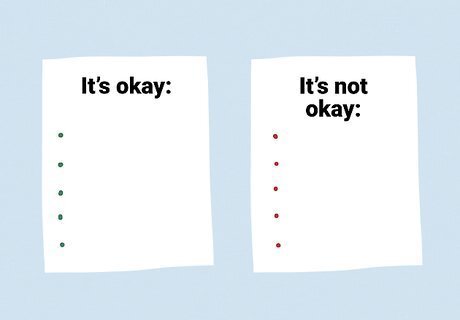
views
Create a safe space.

Find a place where you’re completely free from your parents. This might be your bedroom, or it could be a corner of your garden or backyard. You might even head over to a friend’s home, or some other place where you feel safe and separated from your parents. Whenever things get rough, head to your safe space for some peace and quiet. Try to pick a place where your parents can’t bother or harass you. For instance, a living room or other common area wouldn’t be a great safe space.
Walk away from your parents when things go south.

Head to your safe space instead of adding to the argument. When a conversation gets hurtful and heated, don’t try to fight back—instead, just leave the area. You don’t owe your parents anything, and you don’t have to grin and bear their hurtful comments, either. You could head over to a friend or relative’s home if things get bad.
Set clear boundaries.

Boundaries help create a safe distance between you and your parents. Remember—you don’t owe your parents anything, especially if they’re constantly belittling you. Instead, calmly tell them what is and isn’t okay, and what you’re not willing to put up with. Setting clear expectations for your parents may help prevent future bullying. You might say, “I understand that you don’t agree with all my decisions, but you can’t treat me this way. If you don’t stop making hurtful comments, I’m going to spend as little time at home as possible.”
Limit how much you tell them.

Your parents aren’t entitled to everything that’s on your mind. Think of it this way—if someone was bullying you at school or work, you wouldn’t tell them your biggest secrets and concerns, right? The same principle applies to your parents, too. You have no obligation to keep your parents in the loop about your thoughts, concerns, hopes, and dreams, especially if they’re consistently toxic and rude. This doesn’t mean you have to keep your thoughts and feelings to yourself, though! Share what’s on your mind with a trusted friend, relative, or adult, instead.
Imagine an “L” on your parents’ forehead.

This “L” stands for the word “limited.” It’s really easy to take your parents’ cruel words to heart, especially if you’re still living at home. However, their thoughts and opinions are extremely limited, and don’t represent your worth or capabilities. Picturing this “L” might make it a little easier to distance yourself from your parents’ bullying, and remind yourself that their word isn’t law.
Don’t try to please them.

At the end of the day, your emotional well-being is most important. There’s absolutely nothing wrong with wanting to make your parents happy, but this can feel next to impossible when they’re always saying rude, hurtful remarks. Instead, focus on making decisions that make you happy and fulfilled, instead of worrying about what your parents say. If your parents are bullying you to play a sport, pick a club or activity that you’d like to do instead. If your parents insult your outfit, continue wearing clothes that you really like.
Think before speaking to your parents.

Responding impulsively won’t accomplish very much. When your parents say hurtful, bullying remarks, it’s perfectly understandable if you want to say something mean in return. Unfortunately, replying in the heat of the moment might escalate the conversation, making things worse in the long run. Instead, say something civil and neutral that doesn’t compromise your self-worth. Comments like “That’s interesting” “You’re entitled to your opinion” or “Let me think about that” are some civil, respectful ways you can reply.
Address any painful childhood memories.

Try to trace back the source of your insecurities. Your parents’ hurtful words can have a really big impact on your sense of self-worth, especially if they made mean comments when you were just a kid. Remind yourself that your self-worth is not attached to your parents’ opinion of you. You are a wonderful, worthwhile person, regardless of the grades you get or the activities you do in your free time. If your parents told you as a child that you were “stupid” or “irresponsible” for getting bad grades, tell yourself something like: “My worth isn’t defined by a letter or number. Even if I’m not good enough for my parents, I’m good enough for me, and that’s what matters.”
Practice self-care.

Bullying parents can really take a toll on your well-being. Try to get a good night’s sleep each night, and eat plenty of healthy meals and snacks throughout the day. Take time to exercise as well, whether you’re going for a jog, heading to the gym, or playing a game. In your free time, hang out with friends and relatives that build you up instead of tearing you down. For instance, you might have a movie night with some friends instead of spending the night at home with your parents. The more refreshed and alert you feel, the easier it is to deal with your parents on a regular basis.
Reach out to other friends and relatives.

You don’t have to go through this situation alone. Instead, spend more time with your friends or trusted relatives. Creating a healthy, widespread support system is a great way to remind yourself that you’re not alone. You might call an aunt or uncle that you’re friendly with, or spend more time hanging out with some friends from work.
Talk to an adult at school.

Most high schools and universities have trained professionals on site. Stop by your school counselor’s office and see if you can schedule an appointment. They can walk you through some helpful strategies and ideas so you’ll have an easier time back at home. Feel free to chat with any adult you trust, whether they’re a nurse, teacher, or school administrator.
Call a hotline for support.

Hotlines are a great resource if you don’t have anyone to confide in. Bullying is an awful, helpless feeling, especially when it comes from your parents. Thankfully, there are plenty of supportive, listening ears that are just a phone call away. If you live in the United States, call/text the “Stop Bullying Now” hotline at: 988.. If you live in the United Kingdom, call Childline at 0800 1111. If you live in Canada, call “Kids Help Phone” at 800-668-6868. If you live in Australia, call the “Kids Helpline” at 1-800 55 1800.




















Comments
0 comment